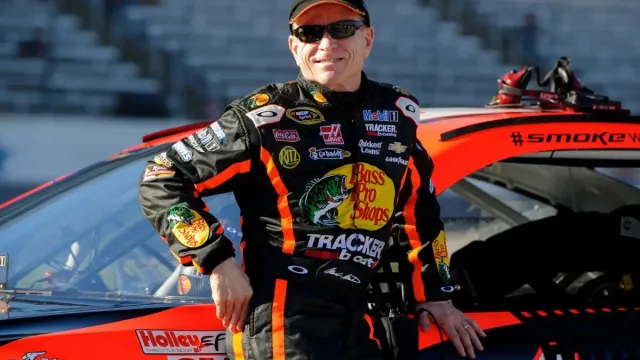Mark Martin’s call for ‘blood-pumping’ ’80s figures is shaking things up in the NASCAR world. As the sport faces its toughest challenges in years, Martin believes it’s time for a change. With the decline of NASCAR’s popularity, he’s urging the return of bold, fiery personalities that once made the sport unforgettable. Could this be the key to bringing NASCAR back to its glory days?
Key Highlights
- Mark Martin criticizes NASCAR for prioritizing driver marketability over genuine talent, undermining the sport’s competitive integrity.
- The recruitment focus has shifted drastically from talent to marketability, a concern for purists like Mark Martin.
- Martin highlights the need for authentic personalities to maintain NASCAR’s engaging narratives and fan connection.
- The sport faces a talent gap as established stars retire, with a lack of emerging true talents.
- Martin calls for a balance between commercial interests and preserving driver skill integrity in NASCAR.
Decline of NASCAR’s Popularity and Challenges
In recent years, the decline of NASCAR’s popularity has become an urgent concern for stakeholders within the sport. Once a dominant force in the sphere of motorsport, NASCAR has seen a waning presence, marked by dwindling television ratings and reduced engagement from Fortune 500 companies. This downward trend can be attributed to several key factors, prominently featuring the escalating costs associated with running a competitive race team. The financial burden has not only affected established teams but has also created notable barriers for emerging talent, complicating the landscape for aspiring drivers.
The financial dynamics of the sport have shifted dramatically since its heyday in the 1980s and 1990s. During that period, NASCAR thrived on robust sponsorship deals and a loyal fan base. Today, however, the sponsorship landscape has evolved, with companies increasingly scrutinizing their investments in motorsport. As fewer corporate sponsors commit to long-term partnerships, teams face heightened strain to secure funding, often leading to compromises in operational capabilities and talent acquisition.
Moreover, the sport’s accessibility for young drivers has become a critical issue. The pathway to NASCAR success is fraught with challenges, as sponsorship and familial connections often outweigh raw talent. This shift has prompted concern among industry veterans, who fear that the sport’s future may be jeopardized by an overemphasis on financial backing over skill.
In addressing these challenges, NASCAR must find a balance that maintains its competitive integrity while also attracting the next generation of fans and drivers, ensuring its enduring legacy.
Mark Martin’s Thoughts on Recruitment and Marketability
Mark Martin has voiced his disapproval regarding the current recruitment criteria for NASCAR drivers, highlighting a shift from talent to marketability as the primary factor for selection. According to Martin, the recruitment process has undergone a marked evolution since the 1980s. During that era, drivers were primarily evaluated and hired based on their talent, with marketability playing a minimal role. Today, however, Martin asserts that marketability has become the dominant criterion, overshadowing the pure driving skill that once defined the sport.
“Before your talent was why you got hired, like being in the 80s, right? For example, in NASCAR you got hired 99% of the time on talent, and now it’s 99% time on marketability.” – Mark Martin
This paradigm change has sparked concern among purists who fear that the essence of the sport is being diluted. Martin’s observations are particularly relevant as the NASCAR Cup Series saw multiple team openings after the 2024 season, a scenario that emphasizes the urgency of this discourse. It is during such periods of change, often referred to as the “silly season,” that the impact of recruitment strategies becomes most apparent.
Martin’s critique serves as a reminder of the importance of balancing commercial interests with the integrity of the sport. While marketability can improve a team’s financial standing and broaden its appeal, it should not eclipse the core attributes that define a successful driver. As NASCAR continues to evolve, the challenge lies in finding a harmonious blend of talent and marketability that preserves the sport’s rich history while embracing modern dynamics.
Riley Herbst’s Signing and Marketability vs. Merit
Riley Herbst’s recent signing has reignited the debate over marketability versus merit in NASCAR’s recruitment strategies. With a family background linked to a successful convenience store chain and a prominent sponsorship from Monster in the Xfinity Series, questions have arisen about whether his rise is driven more by marketability than by raw talent.
The allure of a sponsor-ready candidate often overshadows other deserving prospects, leaving many wondering if the sport is veering away from a merit-based system. While Herbst’s connections certainly aid his rise, it has sparked conversations about the opportunities available to other talented drivers who may lack similar sponsorship backing.
Corey Heim, a rumored contender for the same role, stands as a prime example of talent overshadowed by financial and promotional advantages. Heim’s consistent race victories and championship rivalries highlight a potential that could have thrived given the opportunity.
Mark Martin’s reflections emphasize this shift, as he recalls an era when sponsorship was not a prerequisite for securing a position with top teams like Roush Racing and Hendrick Motorsports. Martin’s success was based on his marketability and skill, not pre-existing sponsorships.
With me, I never had a sponsor that was with me. Roush got all those sponsors, and Hendrick got all those sponsors. None of the Roush sponsors were ever with me and go with me no matter what… It was a different time. I had to be able to be marketable to get hired by those guys.” – Mark Martin
His comments to Chase Holden capture a poignant change in NASCAR’s landscape, where financial backing often trumps the intrinsic talent of a driver. The case of Riley Herbst, supported by family wealth and corporate sponsorship, raises critical questions about the future of NASCAR.
Lack of Driver Identity in Modern NASCAR
A notable transformation has overtaken NASCAR, where the vibrant personalities that once defined the sport are gradually fading into obscurity. Historically, NASCAR thrived on the dynamic stories and distinct personas of its drivers, which attracted sponsors and captivated fans. Icons like Dale Earnhardt, Rusty Wallace, Jeff Gordon, Tony Stewart, and Kevin Harvick became household names, not just for their driving skill but for their compelling narratives and charisma.
In contemporary NASCAR, however, there is a discernible absence of such vivid identities. The drivers appear constrained, as though maneuvering a delicate balance between self-expression and the strains of corporate marketability. This shift has resulted in a sport that some argue feels sanitized and devoid of the raw, unpredictable characters that once fueled its excitement.
The current landscape suggests a need for drivers who can bridge the gap between marketability and individuality. Figures like Ross Chastain and Denny Hamlin, despite not always being universally adored, embody the kind of bold personas that could reinvigorate the sport’s identity. Their willingness to challenge norms and provoke discussion could be instrumental in recapturing the essence of NASCAR’s storied past.
Mark Martin, an influential voice within the sport, has highlighted this necessity, advocating for a return to the days when drivers’ personalities were as much a part of their appeal as their skills on the track.
Without this balance, NASCAR risks losing its unique allure, becoming a mere shadow of its former self, where drivers are indistinguishable from one another, and the sport’s rich tapestry of stories is left untold.
NASCAR’s Need for Polarizing Figures
In the evolving landscape of NASCAR, there is a pressing need for polarizing figures who can captivate audiences and reinvigorate the sport’s dynamic character. While drivers like Kyle Larson, Christopher Bell, and Chase Elliott have established themselves as future stars, their personas do not evoke the same fervor seen in past figures.
Historically, NASCAR thrived on the emotional engagement provided by drivers such as Tony Stewart, whose memorable helmet throw at Matt Kenseth’s car, and Jeff Gordon’s scuffle with Brad Keselowski, captured fans’ imaginations. These moments were not mere spectacles but reflections of authentic, unfiltered passion that left a lasting impact.
Presently, drivers like Denny Hamlin and Kyle Busch continue this tradition, effectively engaging fans with their openness and provocative actions. However, as they near the twilight of their careers, there is an evident gap that needs addressing.
NASCAR must nurture personalities like Ross Chastain, known for “ruffling feathers,” and Noah Gragson, to guarantee the sport retains its compelling narrative. Mark Martin has emphasized the necessity of such figures, highlighting that the blend of talent and charisma is essential for maintaining fan interest.
“We need Ross Chastain to ruffling feathers. Not to say I approve of every time he does it. I’m saying we need it. When we lose Denny Hamlin and Kyle Busch, we’ve got to have some polarizing figures and some guys that get people’s blood pumping. We need Noah Gragson’s personality and Chastain ruffling feathers.” – Mark Martin
Furthermore, the ability of drivers to express themselves authentically on the racetrack is paramount. It not only humanizes them but also fosters deeper connections with audiences.
As NASCAR seeks to blend marketability with authenticity, encouraging drivers to display their true selves during competitions will be significant in sustaining the sport’s vibrant culture and assuring its future resilience.
News in Brief: Mark Martin’s Call for ‘Blood-Pumping’ ’80s Figures
The current path of NASCAR, as discussed by Mark Martin, highlights considerable concerns regarding the sport’s prioritization of marketability over genuine talent. The recruitment focus on market appeal, exemplified by Riley Herbst’s signing, raises questions about meritocracy within the sport.
This shift has contributed to a perceived lack of driver identity and charisma, which historically drew fans. For NASCAR to rejuvenate its appeal, fostering drivers with distinct personalities and returning to a talent-centric approach may be crucial strategies.
ALSO READ: Mark Martin’s Powerful Message for Richard Petty Proves Why He’s the True King of NASCAR



